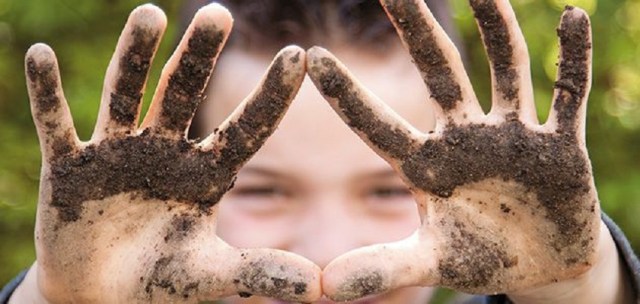Today my son ate dirt for the first time. (Not that I’m going to feed him dirt, but, hey, he’s a boy. I’m sure he’ll eat dirt at least once more before he’s grown.) Binnybeans and I were potting the herbs we bought this weekend, and Budgie was crawling around, investigating dandelions and grass.
As I helped Binnybeans remove the rosemary from the tiny pot, I heard her scream. “He’s eating the dirt!”
I spun around, and there he was, black-speckled tongue hanging out of his mouth and a fistful of dirt. I scoop him up and try to fish the dirt out of his mouth with my finger. Which I was just using to pot the herbs. In dirt. Yeah, that didn’t work.
I made sure there were no chunks he could choke on and I let him be. I didn’t drop everything and race inside for the syrup of ipecac. I didn’t frantically call the pediatrician. I didn’t worry about it… much. (I’m a worrier.)
Why didn’t I lose my mind over a mouthful of dirt? Because it may actually make him healthier. I’m a subscriber to the hygiene hypothesis. According to the FDA’s webpage about the hygiene hypothesis, “young child’s environment can be ‘too clean’ to pose an effective challenge to a maturing immune system.” There is such a thing as too clean.
They continue to say, “extremely clean environments … fail to provide the necessary exposure to germs required to ‘educate’ the immune system so it can learn to launch its defense responses to infectious organisms.” It’s like any other type of learning. You can’t expect to show up at a calculus test and ace it if you’ve never been exposed to basic math. Similarly, you can’t expect to have a robust immune system if you’re not exposed to common microorganisms.
According to the World Health Organization, asthma is the most common chronic condition in children. However, inflammatory responses like asthma and allergies seem to affect children in developed countries and in urban areas at a much higher rate than children in underdeveloped countries and rural areas. Researchers believe this is due to the hygiene hypothesis; those city kids just aren’t exposed to the dirt and germs they need to prevent asthma.
Don’t get me wrong, I’m still careful about what I expose my kids to. I’m not feeding them raw chicken or letting Budgie suck his thumb after getting his tiny hand into a dirty diaper. I’m careful about e. coli and salmonella. I wouldn’t let someone with whooping cough snuggle my Budgie. I follow the CDC’s guidelines about food safety and sanitation.
The researchers agree. Balance is important. Kids need to get outside, but they need to be protected, too. It’s good that he’s literally crawling on the lawn (he’s not walking… yet). It’s good that I sanitize his changing table after an explosive, leaky diaper.
I’m not going to freak out about a tiny fistful of dirt. I’m not going to freak out if he eats a blade of grass or faceplants into the garden while trying to smell a tulip. Come to think of it, he may have been trying to eat that, too.
So I’ll let him get dirty. He’ll “help” us in the garden this summer. While his sister waters the veggies, he can creep along the raised garden bed. And if he gets his hands dirty, I’m totally okay with that. As long as they wash their hands before dinner.
This article was previously published on WellRoundedMom.com
Featured Photo Courtesy: Markus Bormann
_____________
Want to share your stories? Sign up to become a Spoke contributor!











